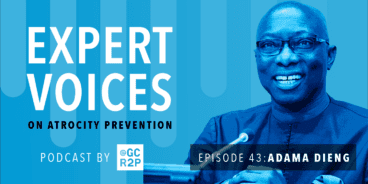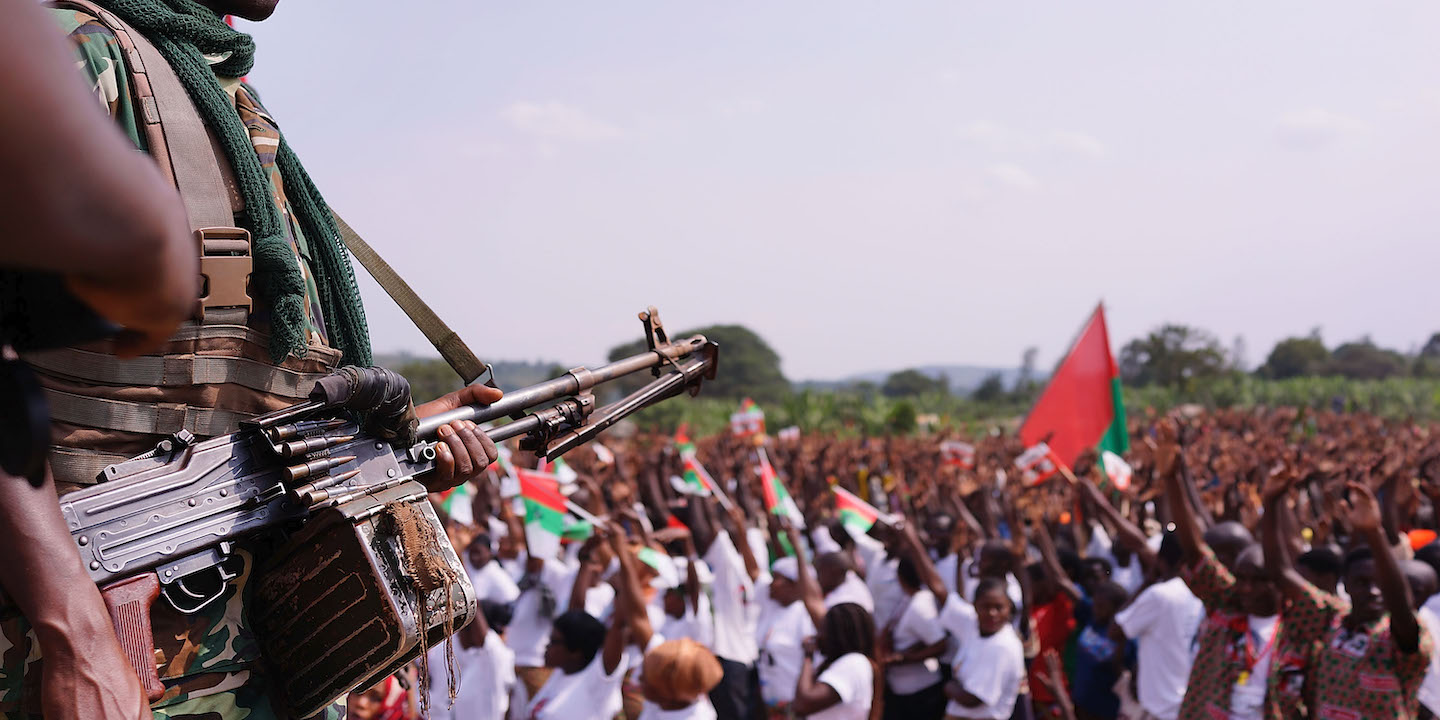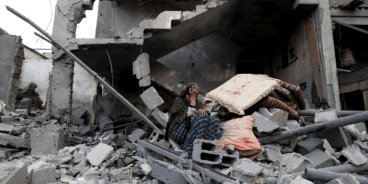

Atrocity Alert No. 200: Burundi, Burkina Faso and COVID-19
Atrocity Alert is a weekly publication by the Global Centre for the Responsibility to Protect highlighting situations where populations are at risk of, or are enduring, mass atrocity crimes.
Election countdown increases risk of atrocity crimes in Burundi
In less than a month Burundians are expected to head to the polls for general elections. In addition to deadly risks surrounding the COVID-19 pandemic, during September 2019 the UN Human Rights Council (HRC)-mandated Commission of Inquiry on Burundi (CoI) warned that the upcoming 20 May elections could result in renewed crimes against humanity.
Despite this warning, the government has failed to implement measures to reduce tensions in the country. At the start of the last HRC session in March 2020, the CoI warned that risk factors had increased significantly since September, including extrajudicial killings, torture, sexual violence and arbitrary detention of perceived political opponents. These acts are often carried out by the Imbonerakure, the youth wing of the ruling party. Political intolerance and hate speech, as well as the repression of civil society and independent media, has created an environment conducive to the perpetration of atrocity crimes.
Burundi has been trapped in a protracted political crisis since 2015, when President Pierre Nkurunziza announced he would run for a third presidential term. Many regarded the decision as violating the constitution and the 2000 Arusha Peace Agreement, which ended a civil war that claimed over 350,000 lives between 1993-2005. Since then, the government has systematically persecuted opponents of the ruling party and has committed possible crimes against humanity.
Next month’s vote is scheduled to take place despite concerns regarding the spread of COVID-19. In recent weeks the government has further restricted freedom of expression and information, threatening individuals accused of spreading false news about the pandemic. Such measures deny Burundians the capacity to access potentially life-saving medical information and further restrict civil space ahead of the election.
On 10 April the CoI stressed that measures to address COVID-19 “should not be discriminatory, nor exacerbate the existing inequalities and vulnerabilities” and insisted that “any potential restriction of fundamental freedoms such as the freedom of movement and assembly must be strictly necessary, commensurate to the evaluated risk to public health, limited in time, and non- discriminatory in nature and in scope.” Six days later the government announced that, due to COVID-19, the Electoral Commission is unable to facilitate the participation of diaspora communities in the election.
The international community, including the African Union and East African Community, should use the remaining weeks before the election to exert maximum diplomatic pressure on the Burundian government to end persecution and actively prevent further violence. The authorities should further consider postponing the May elections to ensure that all Burundians, including the diaspora and refugees in neighboring countries, can safely exercise their right to vote.
Security forces accused of executing detainees in Burkina Faso
On 9 April the Burkinabé security forces allegedly executed 31 detainees following a counter-terrorism operation in Djibo, approximately 200 kilometers north of the capital, Ouagadougou. According to witness testimony gathered by Human Rights Watch, security force personnel arrested the unarmed civilians in response to the presence of armed Islamist groups around Djibo. All 31 men were from the Peuhl (also known as Fulani) ethnic group. In a statement issued on 20 April, the Ministry of Defense said it does not target its own people and if these allegations against the security forces are true, it will take action.
Peuhl villages have been targeted by Burkinabé security forces and local “self-defense groups” due to their perceived support for armed Islamist groups. As armed Islamist groups have increased their attacks in Mali and Burkina Faso over the past few years, killing hundreds of civilians, they have also exploited community grievances over poverty and corruption to target young Peuhl men for recruitment. Growing insecurity has also led to a humanitarian crisis, with more than 775,000 people displaced in Burkina Faso since January 2019.
The Burkinabé security forces have routinely perpetrated grave human rights abuses against civilians during counter-terrorism operations. Extrajudicial killings and other violations amount to collective punishment of the Peuhl community for the actions of those recruited into armed groups.
Christine Caldera, Research Analyst at the Global Centre, noted that “Burkina Faso’s government should impartially investigate the killings and hold those responsible for this potential war crime fully accountable.” All counter-terrorism operations must comply with international humanitarian and human rights law, which prohibits attacks on civilians and summary executions. The government of Burkina Faso, and its international partners, must also help alleviate the grievances that Islamist armed groups are exploiting to fuel identity-based violence between communities.
COVID-19 being exploited to persecute refugees and asylum seekers
Tomorrow, 23 April, will be one month since UN Secretary-General António Guterres appealed for all parties to armed conflicts throughout the world to cease hostilities and focus on confronting the COVID-19 pandemic instead. Despite this global plea – as well as targeted calls for national ceasefires in Yemen, Libya and elsewhere – some armed groups and government forces are continuing offensive military operations, leaving civilians at extreme risk. In the Democratic Republic of the Congo, where fighting in Ituri and North Kivu provinces has resulted in more than 37,000 people being displaced in recent weeks, the failure to agree to a ceasefire hampers access to public health facilities and disrupts anti-COVID-19 efforts.
In divided and fragile societies the COVID-19 pandemic also has the capacity to exacerbate existing identity-based conflict and increase various risk factors that could lead to mass atrocity crimes. In Central African Republic (CAR), which is struggling to uphold a fragile peace agreement, internally displaced persons (IDPs) and members of the Muslim minority face threats resulting from misinformation and sensationalist media coverage of the coronavirus. There are reports that Muslims – who have been historically marginalized as “Arab foreigners” in CAR – are being disparaged as “virus-spreading outsiders.” According to the UN Refugee Agency (UNHCR), armed groups have also forced some IDPs to return to their places of origin, blaming them for the spread of COVID-19.
Many countries are also utilizing the COVID-19 pandemic to reinforce prejudicial policies towards refugees and asylum seekers. Malaysia recently prevented two boats containing hundreds of Rohingya refugees from entering its territorial waters, reportedly for fear that refugees would bring COVID-19 into the country. At least 30 people reportedly died before the Rohingya were rescued by the Bangladesh coast guard.
The fight against COVID-19 does not justify turning away refugees and asylum-seekers at a time when they need protection the most. As states impose travel, border and quarantine restrictions, they must also continue to respect the Refugee Convention and other protections for asylum seekers. UNHCR has warned that COVID-19-related restrictions could “see people in need of international protection attempting even more risky and dangerous border crossings.”
Meanwhile some governments are imposing measures to prevent the further spread of COVID-19 through violence and repression. In the Philippines, President Rodrigo Duterte ordered the police and military to “shoot dead” people who break curfew. In Nigeria the security forces – who have a past history of human rights abuses – have reportedly killed at least 18 people while enforcing measures to prevent the spread of COVID-19.
COVID-19 cannot cause atrocities, but it is already triggering political and economic crises that can be exploited by malignant forces. As the pandemic provides opportunities to deepen divisions between communities, it also demonstrates the importance of defending human rights and upholding our collective responsibility to protect.
Related Content


Atrocity Alert No. 431: Israel and the Occupied Palestinian Territory, Burkina Faso and Sudan
